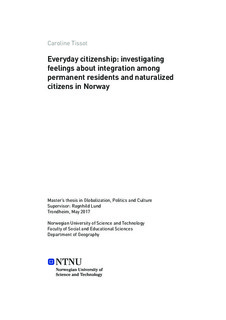Everyday citizenship : investigating feelings about integration among permanent residents and naturalized citizens in Norway
Master thesis
Permanent lenke
http://hdl.handle.net/11250/2506931Utgivelsesdato
2017Metadata
Vis full innførselSamlinger
- Institutt for geografi [1031]
Sammendrag
This thesis looks at how three different aspects of citizenship, namely legal status, rights and emotions, influence on long-term permanent residents, here defined as denizens, and naturalized citizens’ integration in Norway. For that, it adopted a perspective that assumes that citizenship is a concept that can also be constructed from below, being an everyday practice and built by the participants of this study. The research was developed through data collected via semi-structured in depth interviews, with 10 highly skilled participants that reside in Trondheim, Norway. The main concepts that emerged from the participants’ definitions were related to belonging, identity, emotions, rights, practicalities, integration and the idea of ‘othering’. Those who have acquired a Norwegian citizenship legal status emphasized that their life became easier after they did so, although their everyday lives remained mostly the same as they were before they had the legal status. The acquisition also did not influence on how they are accepted and perceived within the Norwegian society. The denizens did not feel the need to change to the Norwegian citizenship, because they can live a regular life in Norway even without having it. Besides that, by keeping their birth citizenship, they can stay active in both countries – in the one they reside, Norway, and in the one they were born hence gain the best of two worlds. Their answers and definitions, combined with the contextual and theoretical frameworks, emphasized the need of having integration policies going beyond providing good structures and practical support; people under emotional constraint need to have their emotions acknowledged and addressed if the integration project is meant to be fully successful and to result in a process that happens through the cooperation of all the actors involved.
